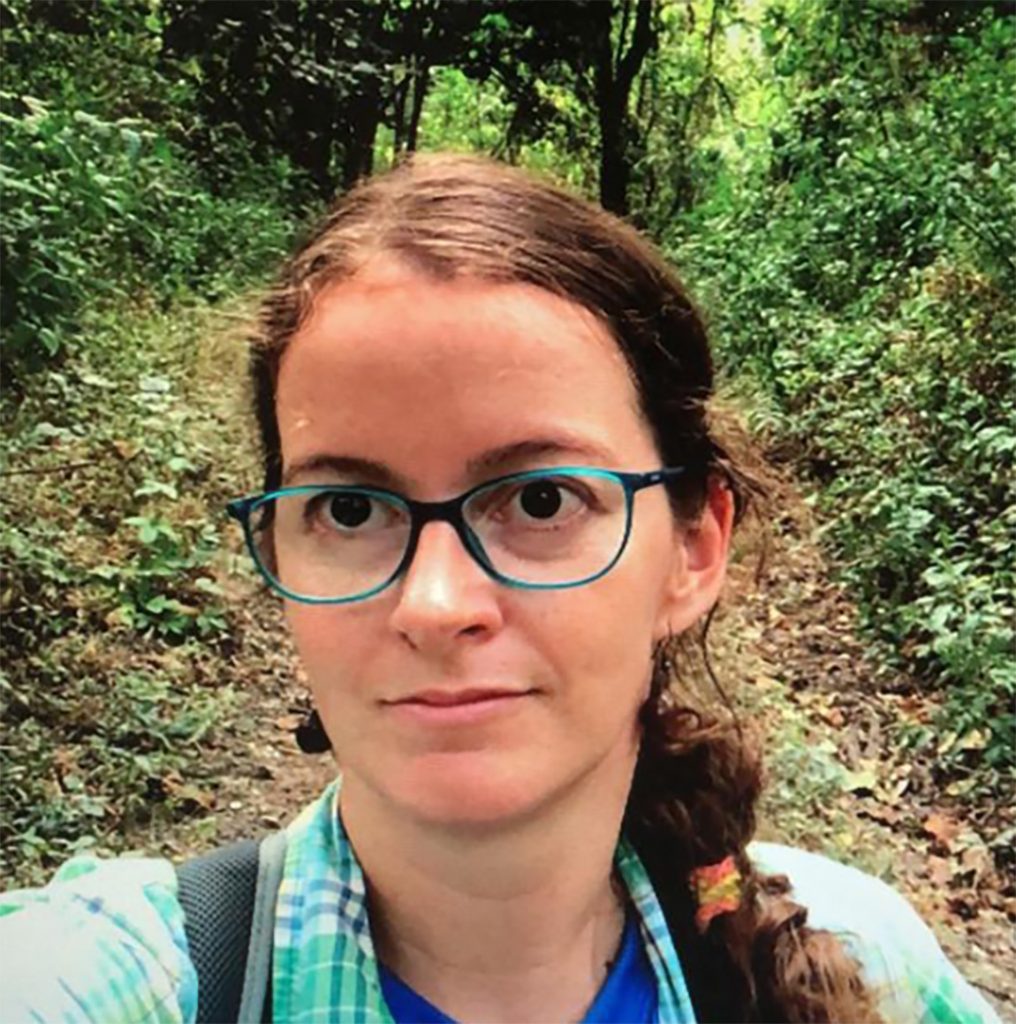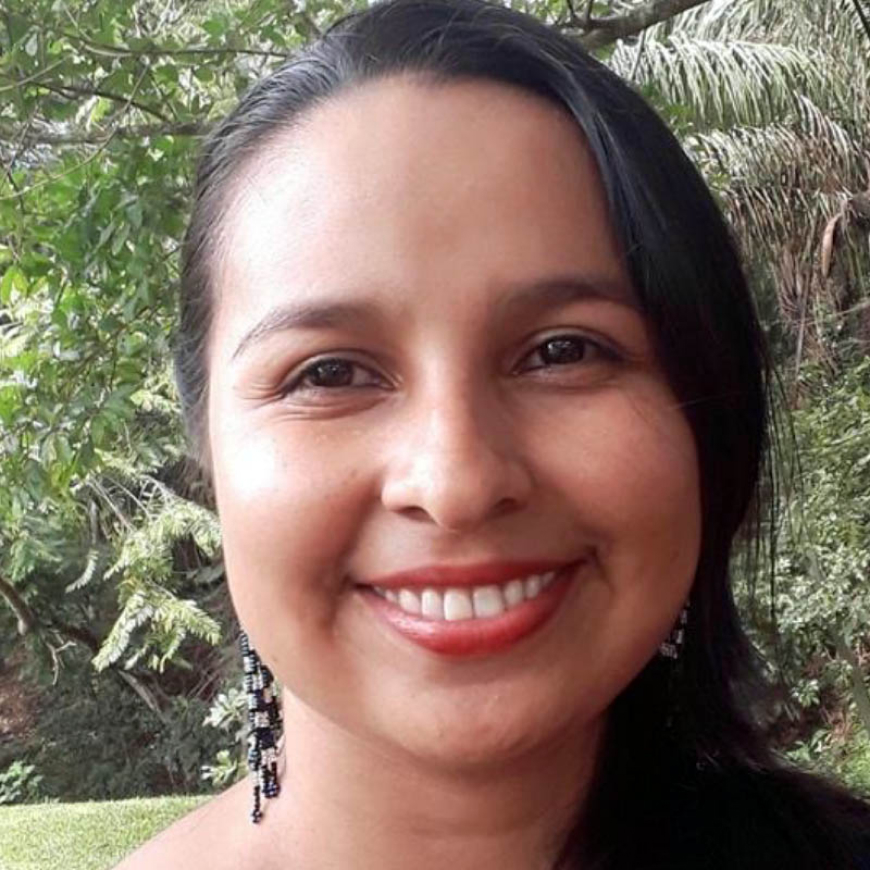Permanent staff
Sabrina Amador
Principal investigator
Ecological and social interactions affect the behavioral responses of organisms. Ant societies in obligate mutualisms with plants are a fascinating pairing for studying coevolution. The plant and the needs it creates on the ant society shapes the behavior and morphology of society members
Yorlenis Y. González
Research Technician
Yorlenis has a Bachelor’s Degree in Biology, with a specialty in Botany at the University of Panama. She has been working in the lab since 2019, where she assists in the organization, design, coordination and execution of research projects on the behavior of Neotropical arthropods. She conducts field and laboratory observations and watches over equipment, materials, and everything related to laboratory logistics. She is interested in biodiversity, ecological associations and in learning new ways of doing science every day, in a practical way and that others can easily understand.
Current lab members
Rosannette Quesada
Postdoctoral fellow
Rosannette did her undergrad and master studies at the University of Costa Rica, working with behavioral plasticity in orb weaver spiderlings. Then, she did her PhD on behavioral ecology at the Instituto de Biociências of the Universidade de São Paulo, researching sexual selection and parental care using Opiliones. She is now a short-term postdoctoral Fellowship with a deep interest in animal behavior and science communication.
She is currently working in our lab on a review paper that aims to investigate what proportion of ant studies have been about behavior of Neotropical ants in the past five years? She is also developing some outreach/educational material regarding the behavior of Neotropical ants and in the past years she has developed an outreach project regarding daddy-long legs. You can find more about that project at: https://www.instagram.com/opilio_tracker/?hl=es
Rowan McGinley
Postdoctoral fellow
Rowan is interested in how animals interact with each other and their environment. He obtained his PhD at Macquarie University in Sydney, Australia, where he studied jumping spiders and the intrinsic and extrinsic factors that mediate their behaviour during male-male contests. He then headed to the USA for postdoctoral research examining the evolution of multi-modal communication in wolf spiders and how heterogenous substrates shape the diversity of vibrational signals used by plant dwelling insects. At STRI, Rowan is returning to work on wolf spiders to further examine how variation in the environment affects the transmission of animal signals, including the behaviour of signallers and receivers. In addition to communication, Rowan has interests in natural history and sexual selection.
Interns, Fellows and Volunteer
- Awanti Shastri.–The George Washington University. Fellow. Project: “Behavioral response of arboreal acacia ants to climate warming” 2024.
- Alice Bossard.– École Normale Supérieure de Paris, PSL University. Intern. Project: “Comportamiento, morfología y toma de decisiones en hormigas”. 2024.
- Jonah Naugle.–The Pennsylvania State University. Intern. Project: “Comportamiento, morfología y toma de decisiones en hormigas”. 2024.
- Dumas Gálvez-Panamá-Volunteer. Project: “Comportamiento, morfología y toma de decisiones en hormigas”. 2023-2024
- Cristian Molina-University of Chicago. Intern. Project: “Comportamiento, morfología y toma de decisiones en hormigas”. 2023-2024
- Laura Segura Hernández-University of Nebraska-Lincoln- Fellow-Proposal: Ecophysiology and behavior of tropical pseudoscorpions in response to microclimate change. 2023-2024
- Daniel Murcia – Universidad de Panamá. Volunteer. Project: “Comportamiento, morfología y toma de decisiones en hormigas”. 2023-2024
Former lab members
Fernando Soley
Postdoctoral fellow
He is interested in the behavioral adaptations of arthropods and in how behavior affects evolution. He has explored these adaptations mainly through predator-prey interactions and foraging behavior. He has a general interest in insects and spiders, and his past research has focused on spider-eating assassin bugs. He is currently doing a comparative analysis of the behavior of assassin bugs in Costa Rica and Australia. Finally, he is also interested in the cognitive and sensory capacities of invertebrates and in how these relate to their ecological challenges.
Dumas Gálvez
Postdoctoral fellow
Dumas Gálvez is a postdoctoral fellow at the Smithsonian Tropical Research Institute. He graduated from a Master in Ecology and Evolution from the University of Groningen (The Netherlands) in 2009. Later, he obtained a PhD focused in Ecology and Evolution in 2014 from the University of Lausanne in Switzerland, where he worked on pathogen – ant interactions. He is currently working on a project aimed at discovering the effects of forest perturbation on the immune competence of the neotropical ant Ectatomma ruidum. Other lines of interest carried out by he and the students under his supervision include conservation, predator – prey interactions, ecology and evolution of arachnids, covering aspects of foraging strategies, defense against predators and pathogens, competition, among others. Moreover, they work with other arthropod groups, mostly aimed at experimental biology and hypothesis testing. He is also interested in the coloration of invertebrates in general, functionality and mechanism of color production. Besides, a current group member works on predator-prey interactions, using agoutis and ocelots as a system. Finally, his previous research experiences also covered subjects in ornithology, herpetology and animal-plant interactions.
Fellows
- Rhayza Cortés (Bolivia, Universidad Mayor de San Andrés). Proposal: “Inclusión de hongos Marasmius en los nidos de aves como un potencial mecanismo para repeler hormigas”. Awarded. 2023
- Rowan French (Canada, University of Toronto, Canada). Proposal: “Exaggerated male traits and brain size in a sexually dimorphic insect”. Acted as advisor. Awarded. 2022
- Katherine Porras (Costa Rica, Universidad Nacional de Costa Rica). Proposal: “Orientation challenges while carrying oversized loads in leafcutter ants”. Acted as advisor. Awarded. 2022
Interns
- Jane Aguilar – Universidad de Panamá. Intern. Project: “Comportamiento, morfología y toma de decisiones en hormigas”. 2023-2024
- Joel Trejos – Universidad Autónoma de Chiriquí. Intern. Project: “Comportamiento, morfología y toma de decisiones en hormigas”. 2023
- Madison Roger–California State University. Intern. Project: “Illumination of behavior leading to host exploitation by a context-dependent mutualist”. 2023
- Ana Martínez – Universidad de Panamá. Intern. Project: “Illumination of behavior leading to host exploitation by a context-dependent mutualist”. 2023
- Akansha Goswami – Project: “Environmental disturbance and its effect on the immune competence of an insect: respirometry”. 2023
- Daniel Murcia – Universidad de Panamá. Inter. Project: “Environmental disturbance and its effect on the immune competence of an insect: respirometry”. 2022-2023
- Grisel Núñez – Universidad de Panamá. Intern. Project: “Building structures to prevent disasters: lessons from social insects”. 2022
- Cristhian Solís – Universidad de Panamá. Intern. Project: “Building structures to prevent disasters: lessons from social insects”. 2022
- Joel Trejos – Universidad Autónoma de Chiriquí. Intern. Project: “Building structures to prevent disasters: lessons from social insects”. 2022-2023
- Leylanie Castro – Universidad de Panamá. Intern. Project: “Orientation challenges while carrying oversized loads in leafcutter ants”. 2022
- Jane Aguilar – Universidad de Panamá. Intern. Project: “Aves que anidan en plantas defendidas por hormigas”. 2022
- Katherine Bonilla – Universidad de Costa Rica. Intern. Project: “Aves que anidan en plantas defendidas por hormigas”. 2022
- Adolfo Alba – Universidad de Panamá. Intern. Project: “Environmental disturbance and its effect on the immune competence of an insect: respirometry”. 2022
- Cesar Amaya – Universidad de Panamá. Intern. Project: “Comportamiento, morfología y toma de decisiones en hormigas”. 2022
- Katherine Porras – Universidad Nacional de Costa Rica. Intern. Project: “Comportamiento, morfología y toma de decisiones en hormigas”. 2021
- Eleodoro Bonilla – Universidad de Panamá. Intern. Project: “Environmental disturbance and its effect on the immune competence of an insect: respirometry”. 2021-2022
- Brenda Virola – Universidad de Panamá. Intern. Project: “Environmental disturbance and its effect on the immune competence of an insect: respirometry”. 2021-2022
- Carlos Vega – Universidad de Panamá. Intern. Project: “Environmental disturbance and its effect on the immune competence of an insect: respirometry”. 2021-2022
- Jorge de la O Castro – Universidad Nacional de Costa Rica. Intern. Project: “Comportamiento, morfología y toma de decisiones en hormigas”. 2021
- Finote Gijsman – University of Northwestern, Evanston, Illinois. Intern. Project: “Comportamiento, morfología y toma de decisiones en hormigas”. 2019
- Maikol Guevara – Universidad de Panamá. Intern. Project: “Comportamiento, morfología y toma de decisiones en hormigas”. 2019
- Aaron de Veres – University of Edinburgh. Intern. Project: “Comportamiento, morfología y toma de decisiones en hormigas”. 2019
- Paula Palacios – Universidad Del Valle (Colombia). Intern. Project: “Comportamiento, morfología y toma de decisiones en hormigas”. 2019
- Vivian Orribarra – Universidad Autónoma de Chiriquí. Intern. Project: “Comportamiento, morfología y toma de decisiones en hormigas”. 2019 & 2021





